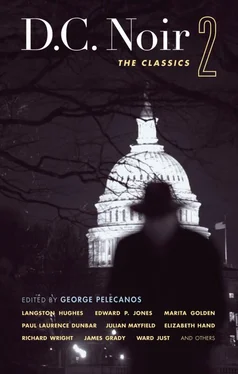The white men accompanying God were very solemn, as though hurt to their souls to think what their Negro employees were suffering, but far more hurt to think that Negroes had wanted to jeopardize a week’s box-office receipts by a strike! That would really harm everybody!
Behind God and the white managers stood two big detectives.
Needless to say, the Negroes finally went downstairs to put on their wings and makeup. All but Logan. He went downstairs to drag the cast out by force, to make men of darkies, to carry through the strike. But he couldn’t. Not alone. Nobody really wanted to strike. Nobody wanted to sacrifice anything for race pride, decency, or elementary human rights. The actors only wanted to keep on appearing in a naive dialect play about a quaint, funny heaven full of niggers at which white people laughed and wept.
The management sent two detectives downstairs to get Logan. They were taking no chances. Just as the curtain rose they carted him off to jail — for disturbing the peace. The colored angels were all massed in the wings for the opening spiritual when the police took the black boy out, a line of tears running down his cheeks.
Most of the actors wanted to think Logan was crying because he was being arrested — but in their souls they knew that was not why he wept.
The man who killed a shadow
by Richard Wright
(Originally published in 1946)
National Cathedral
It all began long ago when he was a tiny boy who was already used, in a fearful sort of way, to living with shadows. But what were the shadows that made him afraid? Surely they were not those beautiful silhouettes of objects cast upon the earth by the sun. Shadows of that kind are innocent and he loved trying to catch them as he ran along sunlit paths in summer. But there were subtler shadows which he saw and which others could not see: the shadows of his fears. And this boy had such shadows and he lived to kill one of them.
Saul Saunders was born black in a little Southern town, not many miles from Washington, the nation’s capital, which means that he came into a world that was split in two, a white world and a black one, the white one being separated from the black by a million psychological miles. So, from the very beginning, Saul looking timidly out from his black world, saw the shadowy outlines of a white world that was unreal to him and not his own.
It so happened that even Saul’s mother was but a vague, shadowy thing to him, for she died long before his memory could form an image of her. And the same thing happened to Saul’s father, who died before the boy could retain a clear picture of him in his mind.
People really never became personalities to Saul, for hardly had he ever got to know them before they vanished. So people became for Saul symbols of uneasiness, of a deprivation that evoked in him a sense of the transitory quality of life, which always made him feel that some invisible, unexplainable event was about to descend upon him.
He had live brothers and two sisters who remained strangers to him. There was, of course, no adult in his family with enough money to support them all, and the children were rationed out to various cousins, uncles, aunts, and grandparents.
It fell to Saul to live with his grandmother who moved constantly from one small Southern town to another, and even physical landscapes grew to have but little emotional meaning for the boy. Towns were places you lived in for a while, and then you moved on. When he had reached the age of twelve, all reality seemed to him to be akin to his mother and father, like the white world that surrounded the black island of his life, like the parade of dirty little towns that passed forever before his eyes, things that had names but not substance, things that happened and then retreated into an incomprehensible nothingness.
Saul was not dumb or lazy, but it took him seven years to reach the third grade in school. None of the people who came and went in Saul’s life had ever prized learning and Saul did likewise. It was quite normal in his environment to reach the age of fourteen and still be in the third grade, and Saul liked being normal, liked being like other people.
Then the one person — his grandmother — who Saul had thought would endure forever, passed suddenly from his life, and from that moment on Saul did not ever quite know what to do. He went to work for the white people of the South and the shadowlike quality of his world became terribly manifest, continuously present. He understood nothing of this white world into which he had been thrown; it was just there, a faint and fearful shadow cast by some object that stood between him and a hidden and powerful sun.
He quickly learned that the strange white people for whom he worked considered him inferior; he did not feel inferior and he did not think that he was. But when he looked about him he saw other black people accepting this definition of themselves, and who was he to challenge it? Outwardly he grew to accept it as part of that vast shadow-world that came and went, pulled by forces which he nor nobody he knew understood.
Soon all of Saul’s anxieties, fears, and irritations became focused upon this white shadow-world which gave him his daily bread in exchange for his labor. Feeling unhappy and not knowing why, he projected his misery out from himself and upon the one thing that made him most constantly anxious. If this had not happened, if Saul had not found a way of putting his burden upon others, he would have early thought of suicide. He finally did, in the end, think of killing himself, but then it was too late…
At the age of fifteen Saul knew that the life he was then living was to be his lot, that there was no way to rid himself of his plaguing sense of unreality, no way to relax and forget. He was most self-forgetful when he was with black people, and that made things a little easier for him. But as he grew older, he became more afraid, yet none of his friends noticed it. Indeed, many of Saul’s friends liked him very much. Saul was always kind, attentive; but no one suspected that his kindness, his quiet, waiting loyalty came from his being afraid.
Then Saul changed. Maybe it was luck or misfortune; it is hard to tell. When he took a drink of whisky, he found that it helped to banish the shadows, lessened his tensions, made the world more reasonably three-dimensional, and he grew to like drinking. When he was paid off on a Saturday night, he would drink with his friends and he would feel better. He felt that whisky made life complete, that it stimulated him. But, of course, it did not. Whisky really depressed him, numbed him somewhat, reduced the force and number of the shadows that made him tight inside.
When Saul was sober, he almost never laughed in the presence of the white shadow-world, but when he had a drink or two he found that he could. Even when he was told about the hard lives that all Negroes lived, it did not worry him, for he would take a drink and not feel too badly. It did not even bother him when he heard that if you were alone with a white woman and she screamed, it was as good as hearing your death sentence, for, though you had done nothing, you would be killed. Saul got used to hearing the siren of the police car screaming in the Black Belt, got used to seeing white cops dragging Negroes off to jail. Once he grew wildly angry about it, felt that the shadows would some day claim him as he had seen them claim others, but his friends warned him that it was dangerous to feel that way, that always the black man lost, and the best thing to do was to take a drink. He did, and in a little while they were all laughing.
One night when he was mildly drunk — he was thirty years old and living in Washington at the time — he got married. The girl was good for Saul, for she too liked to drink and she was pretty and they got along together. Saul now felt that things were not so bad; as long as he could stifle the feeling of being hemmed in, as long as he could conquer the anxiety about the unexpected happening, life was bearable.
Читать дальше











